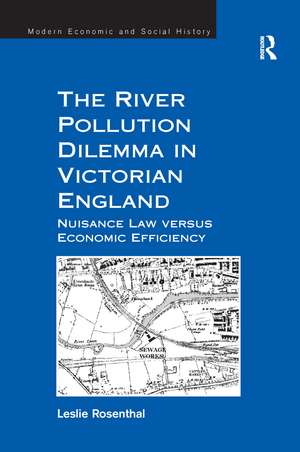The River Pollution Dilemma in Victorian England: Nuisance Law versus Economic Efficiency
Autor Leslie Rosenthalen Limba Engleză Paperback – 9 sep 2016
| Toate formatele și edițiile | Preț | Express |
|---|---|---|
| Paperback (1) | 231.66 lei 6-8 săpt. | |
| Taylor & Francis – 9 sep 2016 | 231.66 lei 6-8 săpt. | |
| Hardback (1) | 487.25 lei 6-8 săpt. | |
| Taylor & Francis – 21 apr 2014 | 487.25 lei 6-8 săpt. |
Preț: 231.66 lei
Nou
Puncte Express: 347
Preț estimativ în valută:
44.33€ • 47.40$ • 36.96£
44.33€ • 47.40$ • 36.96£
Carte tipărită la comandă
Livrare economică 17 aprilie-01 mai
Preluare comenzi: 021 569.72.76
Specificații
ISBN-13: 9781138246188
ISBN-10: 1138246182
Pagini: 274
Dimensiuni: 156 x 234 x 15 mm
Greutate: 0.45 kg
Ediția:1
Editura: Taylor & Francis
Colecția Routledge
Locul publicării:Oxford, United Kingdom
ISBN-10: 1138246182
Pagini: 274
Dimensiuni: 156 x 234 x 15 mm
Greutate: 0.45 kg
Ediția:1
Editura: Taylor & Francis
Colecția Routledge
Locul publicării:Oxford, United Kingdom
Cuprins
Contents: Preface; Introduction: the river pollution dilemma; Victorian Britain I: public health and local government; Victorian Britain II: river pollution and sanitary engineering; Nuisance law and nuisance economics; Birmingham, Adderley and the River Tame; Delays and contingencies: Leeds and Barnsley; The threat of sequestration: Leamington Spa and Tunbridge Wells; Negotiation and settlement: Harrogate and the St Helens canal; The tactic of diversion: Northampton and the Brinsop Hall Coal Company; Protection by statutory legislation: Wolverhampton; Conclusions; Bibliography; Index.
Notă biografică
Leslie Rosenthal is Honorary Fellow at Keele University, having been Senior Lecturer in the Economics Department. He has published widely in academic journals, with his later research interests focused in the area of the economic analysis of the law.
Recenzii
'The River Pollution Dilemma in Victorian England, is a careful and scholarly work that will be of interest to anyone working at the intersection of economics, law, and public health, especially if they have an interest in public water and sewer systems. The author does an excellent job sketching out the relevant economics and then showing how history illustrates those economic principles. ... this is a fine book that addresses an important historical problem. It merits the serious attention of anyone working in the field.' EH.Net 'This book provides a good contribution to the field of urban environmental history. Scholars interested in urban metabolisms, the sanitary city, and Victorian environmental management will find it compelling reading. The River Pollution Dilemma not only focuses on the effects of the sanitary city on the land and rivers outside the urban boundaries but also shows how the consequences of these effects fed back into the towns’ management of their sewer systems.' H-Net ’Leslie Rosenthal’s ’stories of the sewers’ (p. xiv) are fascinating and written with a clarity of style that carries the reader effortlessly over some very murky ground; for this reviewer, at least, it constituted a goodread. Yet this is nopopular account of its subject, but a thoughtful and sober analysis of the problems involved in resolving the adverse environmental consequences of unregulatedand rapid urban development.’ Social History of Medicine ’...this is a fine study, with relevance to environmental policy-making past and present. One hopes it will stimulate other historians of the period to examine such cases similarly closely.’ Economic History Review
Descriere
Nineteenth-century Britain witnessed a dramatic increase in its urban population, as a hitherto largely rural economy transformed itself into an urban one. Though the political and social issues arising from these events are well-known, little is known about how the British legal process coped with the everyday strains that emerged from the unprecedented scale of these changes. This book explores the river pollution dilemma faced by the British courts during the second half of the nineteenth century when the courts had to confront the new incompatible realities arising from the scale of untreatable waste flowing into the rivers.
